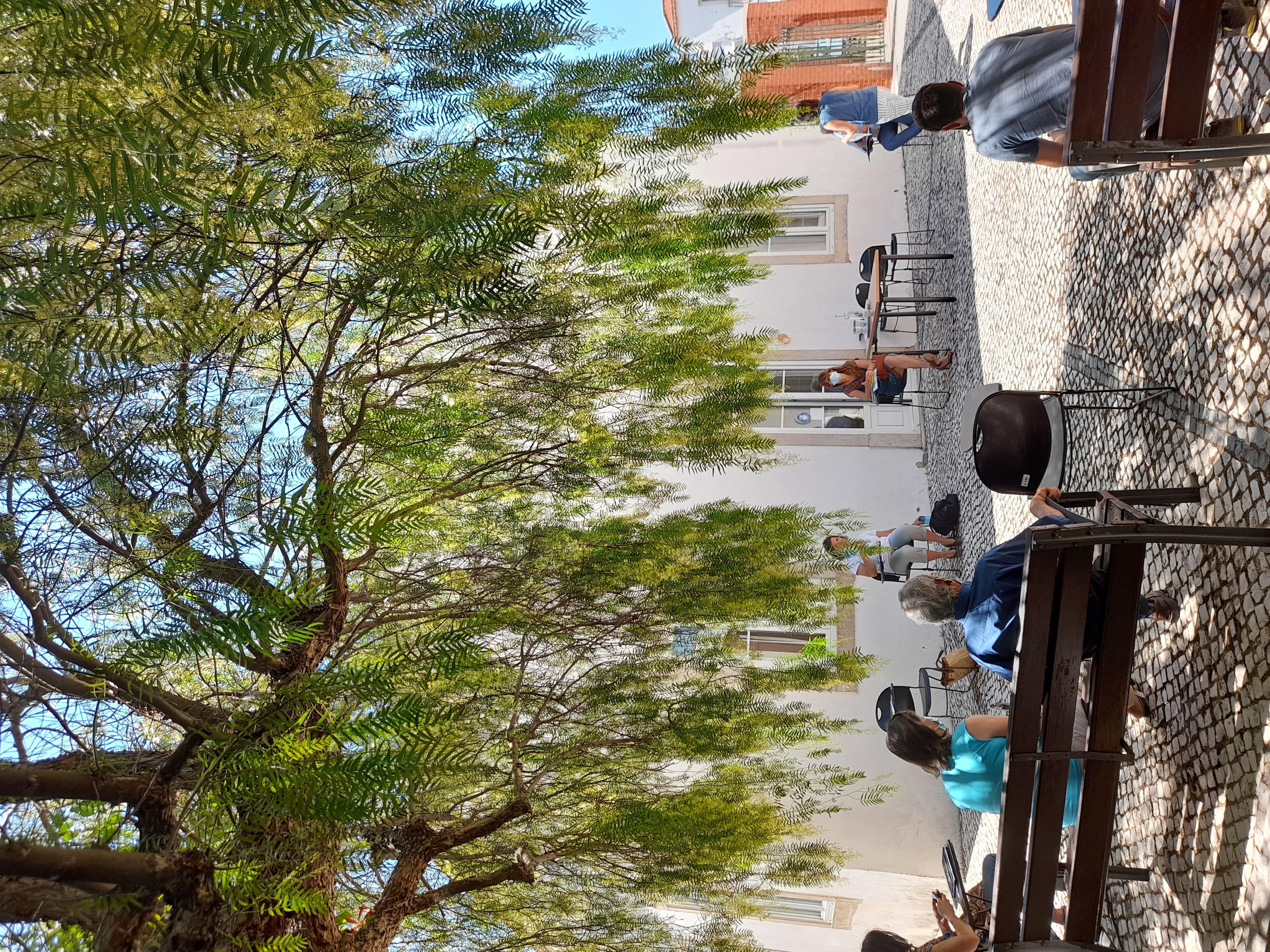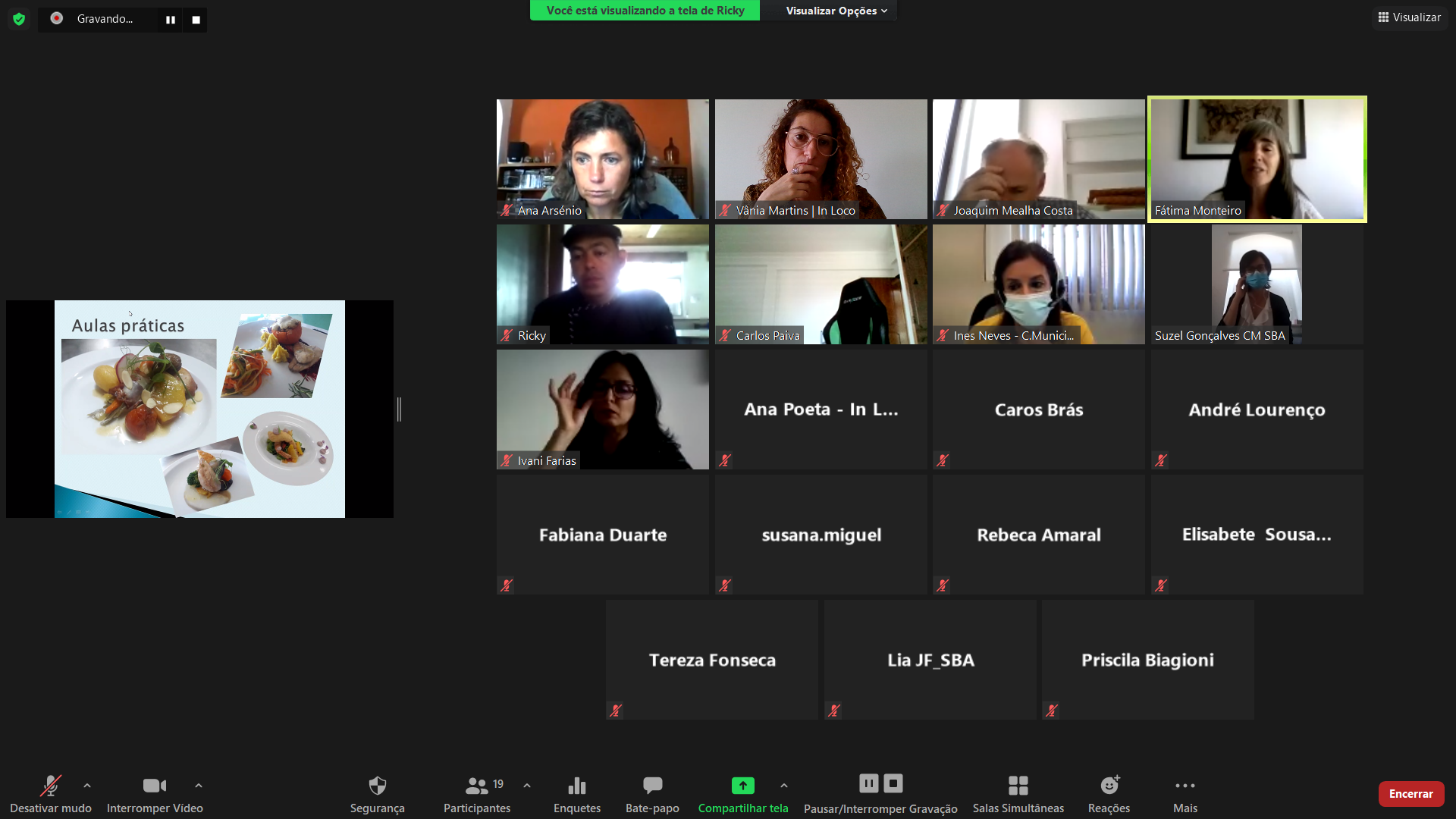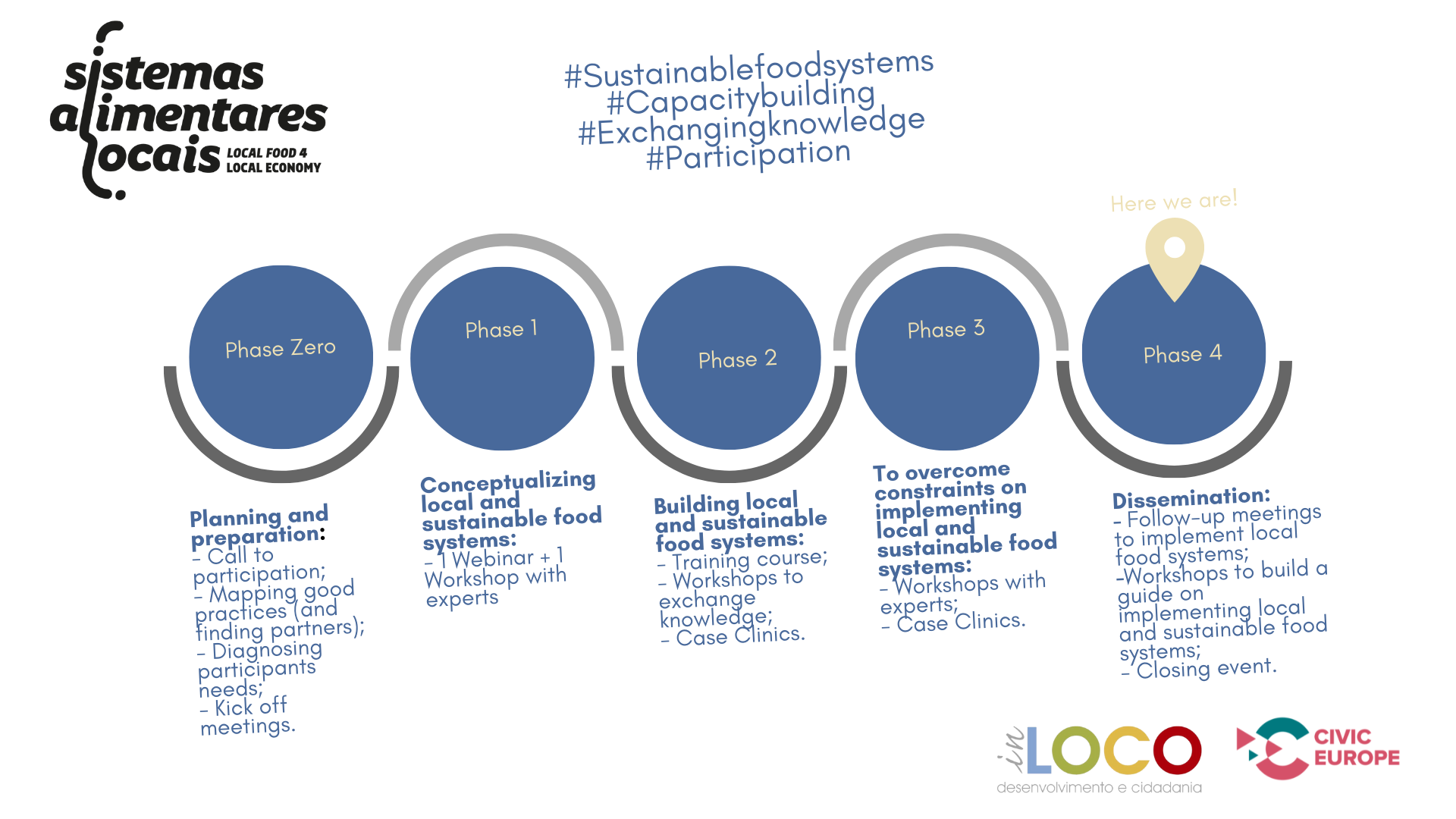Local Food 4 Local Economy winner
Training key-actors for the conception and implementation of a model for supplying social feeding with local production in the Algarve, through participative approaches and decision making processes.
Idea
Idea pitch
Tired of watching the global food supply chains dictate what to eat and aware of the huge impact that food and transportation have on Portugal's ecological footprint, a non governmental organization decided to mobilize key-actors in the Algarve region, in order to work on an alternative model for food supply. Farmers, social services and local authorities will be challenged to take a critical look at current systems and to co-create a new model for social feeding, supplied by local production.
Where will your project idea take place?
It will take place in rural Algarve (South Portugal) in the sparsely populated inlands.
What is the specific societal challenge faced by this region?
The main challenges are lack of participation, co-decision, bringing consumers and producers together to debate about supply chains and local food systems, namely those that bring farmers and consumers to the discussion; leverage assets and resources at every stage of the supply chain to make food systems change locally; developed skills to support a local food system expansion; building a local supply network of local products in order to contribute to develop sustainable models; raise local authorities and partners on issues like local production, food sustainability, primary sector dynamization and citizens’ participation; raise consumers confidence in local production and local farmers confidence regarding their future activities; options to local products commercialization.
Who are you doing it for?
In order to discuss and implement a model of local food supply, we’ll need to involve different target groups, namely local farmers, canteens staff, local authorities like municipalities and schools, staff from social services and decision makers. Each participant will bring different perspectives due to its position in the food supplying chain, its purchasing power, its level of compromise and citizen participation, its representation, and also its motivation. We intend to promote sharing spaces where everyone can understand its role in the food supplying chain and the importance of adopting an active part in local food supplying issues, realizing the advantage there is in assuming this issues collectively in order to find satisfactory solutions.
How do you plan to get there?
We will use participative investigation-action, which comprehends different phases: researching, planning, taking action, evaluating and building collective knowledge. This approach is deeply engaged with participation. It generates co-creation and co-decision spaces deeply rooted in the territory’s reality, needs and potentialities. Some main steps for implementation: mobilization of key target groups, identification and exchange of good practices in supplying cantines with local food production; training courses to inform and to raise awareness about the impacts of this issue on enhancing local production; focus-Groups and other public meetings to establish a territorial diagnosis and, in an advanced phase, co-create a model to supply canteens with local food production.
What are the expected results?
A year from now we will have a high range of local actors and authorities aware about the importance of local production as a mean to guarantee social, cultural and economical development at local and regional level; low environmental footprints; fresh/tasty food and nutritionally balanced meals. We’ll also have ii) a participative diagnosis about territory’s reality and capacity to self-provisioning social feeding; iii) a model to supply canteens with local food production that can be implemented by local authorities; iv) key target groups aware and mobilized to implement the model in their own organizations; v) local producers in articulation with schools, town halls and public social services, ready to increase their production in order to answer the increased demand.
How does your idea strengthen active citizenship at a local and community level?
Through its methodology it will promote spaces that highlight participation and engagement, where different local actors will be involved in order to discuss different perspectives towards the issues they have to deal with; generate co-constructed ideas about the territories’ needs and potentialities; contribute to a collaborative model of a locally based food system; understand issues regarding current chain food supply and its impacts, as well as the importance of local production. A multidisciplinary approach will allow target groups to be actively involved in the process, will promote bottom-up decision-making spaces and empower target groups to promote changes at local level, which will contribute to territories sustainability.
Why is this idea important to you?
The importance of this idea relies in the fact that it is the first phase of a process that can change local production (by increasing it), and local social feeding (by providing fresh, quality and locally based ingredients, in order to guarantee healthier and tasty meals in schools and social equipments). Besides contributing to increase health, this will bring economic growth to the region, sustainability to small farmers, and the maintenance of agricultural activities, landscapes and our cultural food heritage. It is completely aligned with our vision of a participative, solidary and sustainable world, where local development is a process of permanent education, civic participation and solidarity, that tries to fulfill today's needs without compromising futures’ sustainability.
€ 50000,-
Total budget
€ 50000,-
Funding requested from Civic Europe
Major expenses
Staff Costs 28415 EUR; Licensed Accountant 855 EUR; Office Expenses 1700 EUR; Travel and Accommodation 6500 EUR; Costs with Events 2030 EUR; Design and Communication 4500 EUR; Consultants 3000 EUR; Trainers 3000 EUR.
What do you need from the Civic Europe community?
We are interested in receiving feedback if there are any similar inspiring ideas regarding applying participative approaches to promote local food systems, or even just about local production and sustainability. We are open to everything that adds different points of view on these issues.
Project Journey
Let's get this started: mobilizing stakeholders
When our project started the situation was very different from what we have predicted when applying to the Idea Challenge, because a pandemic crises emerged and, with that, a lot of constrains and limitations to group meetings and travels. This lead us to rethink our strategies to mobilize and connect with local actors.

Step 1. Call to participation
We already had a data base with stakeholders’ contacts such as decision-makers, local authorities’ employees, social media, small farmers, schools, workers from NGO and other civil society organizations, etc., so we use it to launch and spread a call to participation, mostly by e-mails, press releases, phone calls and social networks. In all our communications we shared a link where those that were interested in joining the project could apply by leaving their identification, contacts and also sharing what they were doing in terms of implementing local food systems (through short supply chains - SSC) in their territories and what constraints they felt.
This allowed us no just to identify stakeholders interested in the project, but also to know them a little better and to understand / diagnose their needs.
This exceeded our expectations because: i) We had more than one hundred applicants; ii) The applicants were heterogeneous in terms of its institutional and territorial representativeness.
We also did an extensive research on good practices in SSC in Portugal and we gathered this information in a database (we find more than 20 experiences). We contacted some of these good practices and interviewed them in order to better understand their work, their strategies to solving problems and its strengths and differentiating aspects.

Step 2. To design a project that meets the needs of those who attended the call
Although we had an idea of what we intended to accomplish with the project and what actions should be developed, when designing the action plan we had to have in mind all the information that we collected during the call, namely the experience and the needs of the applicants and also the good practices.
The action plan had to be able to: i) capitalize the attendants’ knowledge; ii) answer their needs in order to keep their motivation and to achieve better and useful results.
So we design an action plan by phases:
- Conceptualizing local / sustainable food systems. We developed two webinars with experts to address the problematic of global and Portuguese food supplying chains and their impacts, to expose the importance of adopting sustainable food systems, with SSC.
- Building local and sustainable food systems. A training course, workshops to exchange knowledge and technical support to pilot projects.
- To overcome constrains in local food systems. Workshops with experts and technical support to pilot projects.
- Dissemination. Follow-up of the pilot projects and collaborative design of a guide to implement local food systems.
In this action plan the following methodology was adopted:
- Problem-solving orientated. The thematic issues addressed in phases 2 and 3 were designed to address the constraints felt by the participants and diagnosed during the call. In order to do this we develop workshops with experts as well as group and individual sessions.
- Peer to peer learning. The attendants were invited to all the activities and asked to contribute with their personal experience and knowledge (namely in specific group sessions to work on the support to solve constraints of the pilot projects). Also, intermediates of the good practices were invited to share their experience and knowledge with the group, in exchange workshops.
- Tutorial assistance. The project team provided technical support to implementing local food systems, namely helping to: diagnose and solve constraints (not just on individual sessions, but also facilitating group sessions), identify and mobilize stakeholders, clarify the goals of the pilot project, designing action plans.
- Collaborative knowledge. The exchange workshops, workshops with experts, webinars and also the tutorial support of the pilot projects fomented dialogue, ideas discussion and participation of all the attendants. This allowed the project team to gather and share all this collective knowledge in a “Guide” that will be issued by the end of the project.
We finally reached the final phase of our project
That's it: we are very glad to announce that we have achieved the last phase of our project!
This last four month of our project have been full of dynamics and activities. We started in december 2020 by planning and preparing tasks. Due to Covid-19, its restrictions and security measures, we had to rethink our project because we see ourselves unable to organize face-to-face activities. So we decided to develop a series of weekly online workshops, webinars, trainings and meetings from march to july, with different purposes: i) to create a common understanding about local food systems, sustainability and the impact of food in our environment, health, economies, etc; ii) To help local actors to build their local and sustainable food systems and to overcome constraints and needs.

We provided more than 50 hours of capacity building activities during these last months and brought to participation 77 people from local and regional authorities, non profit organizations, local producers, citizens and universities. We were able to establish partnerships with 7 organizations in order to bring their experience and knowledge to the project and promote exchange activities with the participantes. Also, we are currently assisting the implementation of 9 local food systems in 6 municipalities of the Algarve region, in southern Portugal.
We are looking forward to starting to work on a publication where we will share all the collective knowledge that we have built around sustainability and local food systems in the Algarve region!
Write comment